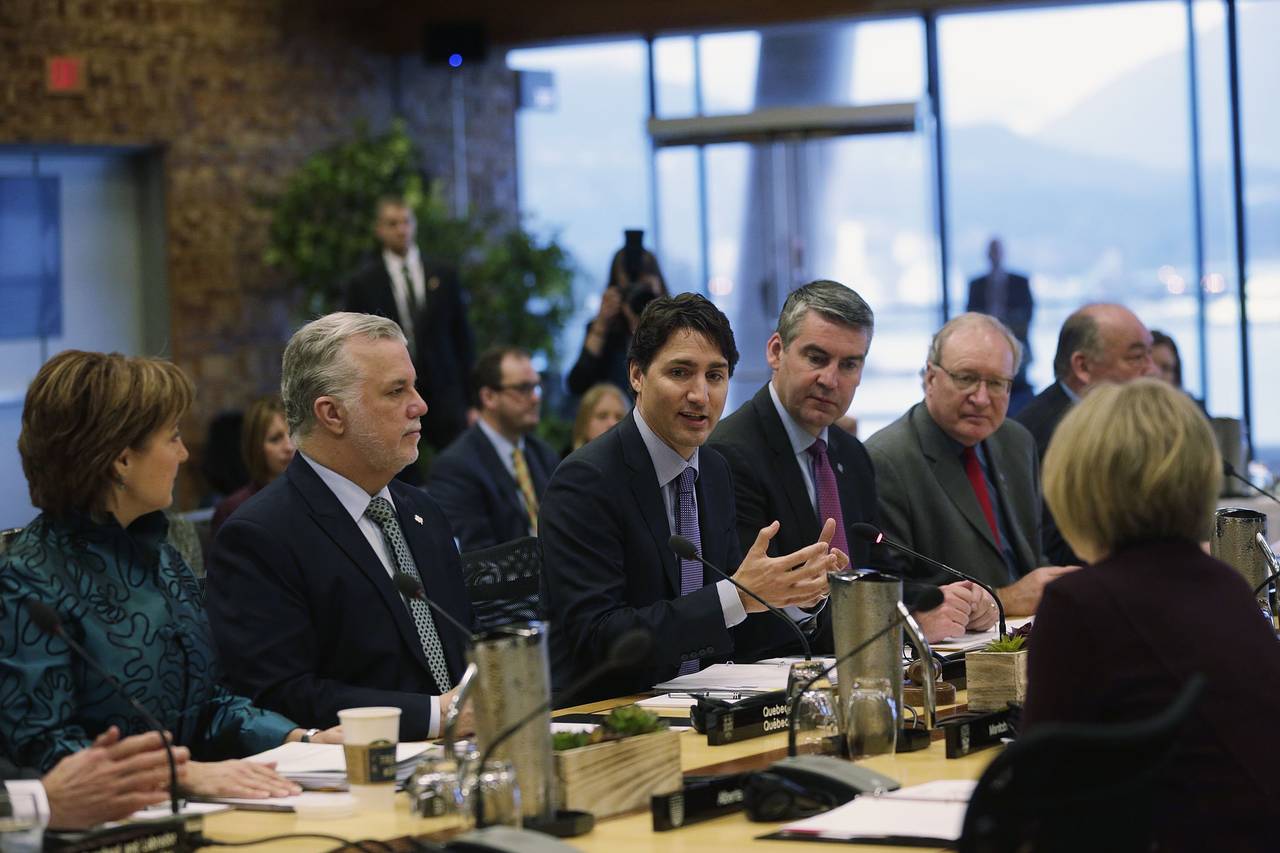US Trade Threats Loom Large Over Canadian Election

Table of Contents
The Impact of US Trade Policies on the Canadian Economy
The Canadian economy is deeply intertwined with that of the United States, making it highly vulnerable to shifts in US trade policies. Several key sectors face significant risks from US trade threats.
The Automotive Sector
The Canadian automotive industry is a cornerstone of the national economy, employing hundreds of thousands of Canadians. However, it remains extremely susceptible to US trade actions. The imposition of tariffs or restrictions on auto parts and finished vehicles could have devastating consequences.
- Economic Consequences: Potential trade disruptions could lead to significant job losses in manufacturing and related industries, a decline in Canadian auto exports, and reduced foreign direct investment in the sector. Statistics from the Canadian Automotive Parts Manufacturers' Association could highlight the potential scale of job losses. Data on export volumes and trade deficits should also be included.
- Keyword Integration: The vulnerability of the Canadian auto industry to automotive tariffs, the impact on bilateral trade, and the overall economic impact of potential US trade actions need to be emphasized. The ongoing discussions regarding bilateral trade agreements will need to be addressed, highlighting the importance of these agreements to maintain economic stability within the Canadian auto industry.
The Lumber Industry
The Canadian lumber industry has a long history of trade disputes with the US, primarily revolving around softwood lumber. These disputes, often characterized by anti-dumping and countervailing duties imposed by the US, have created significant economic uncertainty for Canadian lumber producers.
- Cyclical Nature of Disputes: The cyclical nature of these disputes leads to job insecurity in the forestry sector and impacts export volumes. Data on export volumes and trade deficits during periods of trade conflict need to be included to illustrate the economic consequences.
- Political Ramifications: These trade tensions often spill over into political discourse, influencing relations between the two countries and impacting the Canadian election. Relevant historical examples of these trade disputes and their political consequences should be discussed.
- Keyword Integration: The discussion should highlight the ongoing challenges posed by US trade actions on the Canadian softwood lumber industry, including the use of export restrictions and lumber tariffs, and their impact on the Canadian economy.
Energy Sector Vulnerability
The Canadian energy sector, particularly oil and gas, is significantly reliant on US markets. Potential restrictions on Canadian oil imports, driven by US energy policies, could severely impact the Canadian economy.
- Pipeline Projects and Energy Exports: The success of various pipeline projects and the ability to export Canadian energy resources depend heavily on the stability of the US-Canada relationship. The potential disruption of these projects due to US energy policies could have enormous economic repercussions.
- Geopolitical Implications: US energy policies could also have geopolitical implications for Canada, affecting its relationships with other energy-consuming nations.
- Keyword Integration: The impact of US energy policy on Canadian oil exports, the importance of pipeline projects to Canadian energy security, and the broader implications for the Canadian economy need to be clearly explained.
Political Responses to US Trade Threats
The upcoming Canadian election will see the various political parties present distinct approaches to navigating the complex landscape of US trade relations.
Differing Approaches of Political Parties
Major Canadian political parties are likely to offer different strategies for addressing US trade threats and protecting Canadian interests. A detailed comparison of the proposed strategies outlined in each party's election platform is crucial.
- Party Positions: Include specific quotes from party leaders or policy documents to illustrate their stances on trade issues and their approaches to negotiating with the US.
- Keyword Integration: The discussion should analyze each party's trade policy, their political strategy for addressing US trade threats, and the overall positions taken in their election platforms. The goal is to highlight the differing approaches and their potential implications.
Public Opinion and Voter Sentiment
Public opinion on US trade issues plays a significant role in shaping the election narrative. Understanding voter sentiment towards US trade threats is essential for accurate analysis.
- Election Polls and Public Opinion: Cite relevant polling data and news reports to demonstrate public concern and anxieties surrounding trade relations with the US.
- Keyword Integration: The discussion needs to incorporate data from election polls and relevant reports illustrating public opinion regarding US trade actions and their potential impact on the Canadian economy and the Canadian-US relationship.
Potential Outcomes and Future Implications
The outcome of the Canadian election will have profound consequences for Canada-US relations and the Canadian economy.
Scenario Planning
Depending on the winning party's approach to US trade relations, several potential outcomes can be envisioned. Each scenario will have specific consequences for the Canadian economy and its relationship with the US.
- Election Outcome and Trade Negotiations: Explore potential scenarios based on the different political parties’ approaches to trade negotiations with the United States.
- Keyword Integration: The discussion should analyze each scenario's potential impact on future prospects and economic uncertainty within the context of the election outcome.
Long-term Implications for Canada-US Relations
The election will have long-term implications for the overall Canada-US relationship. Depending on the political climate, increased cooperation or further strained relations are possible.
- Bilateral Relations and Strategic Partnerships: Analyze how the different election outcomes could impact bilateral relations between Canada and the US, and the long-term effects on strategic partnerships.
- Keyword Integration: The discussion should emphasize the potential impact on diplomatic ties, North American trade agreements, and the overall strategic partnership between Canada and the US.
Conclusion: US Trade Threats and the Canadian Election - A Pivotal Moment
The upcoming Canadian election will be significantly shaped by the looming threat of US trade actions. The various political parties' approaches to these threats, coupled with public sentiment, will determine the future direction of the Canadian economy and its relationship with the US. The impact of US trade threats on the Canadian economy is undeniable, and understanding these threats and the various parties’ plans to address them is critical for informed participation in the democratic process. The looming shadow of US trade threats necessitates informed engagement in the Canadian election. Understand the candidates' plans to address these critical issues and make your voice heard! Stay informed about the impact of US trade threats on the Canadian election.

Featured Posts
-
 Arne Slots Liverpool A Premier League Near Miss
Apr 29, 2025
Arne Slots Liverpool A Premier League Near Miss
Apr 29, 2025 -
 New Music Willie Nelsons Oh What A Beautiful World
Apr 29, 2025
New Music Willie Nelsons Oh What A Beautiful World
Apr 29, 2025 -
 The Pete Rose Pardon Examining The Legal And Political Ramifications
Apr 29, 2025
The Pete Rose Pardon Examining The Legal And Political Ramifications
Apr 29, 2025 -
 Nyt Spelling Bee February 12 2025 Find The Pangram And All Answers
Apr 29, 2025
Nyt Spelling Bee February 12 2025 Find The Pangram And All Answers
Apr 29, 2025 -
 Fn Abwzby 2024 Brnamj Shaml Wfealyat Mmyzt
Apr 29, 2025
Fn Abwzby 2024 Brnamj Shaml Wfealyat Mmyzt
Apr 29, 2025
Latest Posts
-
 Concern Mounts For Missing Midland Athlete In Las Vegas
Apr 29, 2025
Concern Mounts For Missing Midland Athlete In Las Vegas
Apr 29, 2025 -
 Midland Athlete Vanishes In Las Vegas Urgent Search Underway
Apr 29, 2025
Midland Athlete Vanishes In Las Vegas Urgent Search Underway
Apr 29, 2025 -
 Convicted Cardinal Claims Right To Participate In Papal Conclave
Apr 29, 2025
Convicted Cardinal Claims Right To Participate In Papal Conclave
Apr 29, 2025 -
 Update Missing Brit Paralympian Found Following Wrestle Mania Disappearance
Apr 29, 2025
Update Missing Brit Paralympian Found Following Wrestle Mania Disappearance
Apr 29, 2025 -
 Papal Conclave Legal Battle Over Convicted Cardinals Voting Eligibility
Apr 29, 2025
Papal Conclave Legal Battle Over Convicted Cardinals Voting Eligibility
Apr 29, 2025
